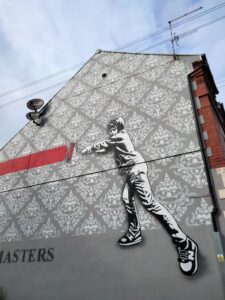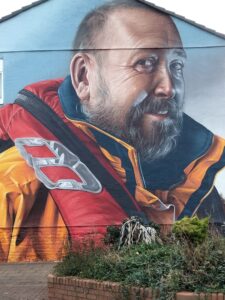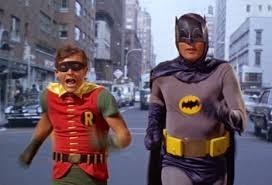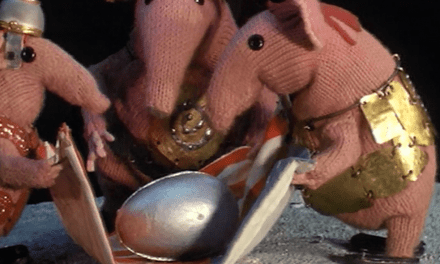Is it just me, or do you currently want to spend a lot of time sticking your head in the sand? I live in the UK, and if you live elsewhere, less Johnson-or-similar-run, you will probably not have quite that urge. But… it’s COP26, the world leaders came together, and you could feel them heating the atmosphere with their speeches. The sense of having only hot air delivered as policy is frustrating; but worse is that I, and I know many others experience similar sentiments, feel utterly powerless to do something about it.
So, head in the sand it is.
Or is it? As academics, we often cannot help ourselves. Our analyses lead to critiques lead to political positioning. But what can we, TV scholars, actually do? I ask this question living in a country with such an archaic voting system as first-past-the-post which can make voting feel utterly useless because the same old parties will win no matter who you vote for. Habits, TV scholars of all people should know, run deep.
So let me ask again: what can we do? Some of us have decided to direct our attention to the question of sustainability and the media. Richard Maxwell and Toby Miller’s analysis of how the media are greenwashed through, essentially, spin has also given us suggestions of alternatives. The British Academy of Film and Television Arts (BAFTA), in collaboration with the BBC, has developed the Albert initiative, which allows productions to calculate their carbon footprint. More than that, Albert trains people up into sustainable television and film production by giving production crew the tools to work more sustainably. This means that television production, itself a not exactly sustainable process, is becoming increasingly green – or at least greener than before. This has seen the average carbon footprint per production drop already, though after the first year, it was also clear that there was still quite a way to go. The biggest issue is travel (see Year One Report), closely followed by the production office. One thing the pandemic has shown is that these elements of the footprint can be significantly reduced by home working and trusting local production crews with shooting the footage needed (Steve Smith, Picture Zero Productions, in a Q&A with Edge Hill Students, 1 November 2021).
As TV educators, we can teach our students about this and other initiatives. But television also has the purpose to inform and educate audiences, and more and more work is done by productions to do this: from hits like Cowspiracy (Kip Andersen, Keegan Kuhn, 2014) and Seaspiracy (Netflix, 2021), to smaller productions like the documentary on the Citizens Assemblies on Climate Change (The People vs. Climate Change, BBC, 2021) or lifestyle television like Shop Well for the Planet (BBC, 2021). This, too, we can and indeed should draw attention to.
But in many ways, this is the bare minimum that we can do. In a period that many of us experience as a backlash against democracy, where populations feel increasingly powerless, but where we also have seen the power of our public service broadcasters severely undermined, a more radical approach might be needed. In that regard, I am drawing on the work of Saskia Sassen and her ideas of the post-national (2002a, 2002b, 2003a, 2003b, etc). Sassen points out that nation states are under pressure from two developments: on the one hand the increasing globalisation of transnational entities such as the European Union, but also trade deals and internationally operating businesses. On the other hand, the movement is towards an increasing focus on the local, on trying to tackle the problems at a very local level through community work and activism.
This second element of community work and activism is just as palpable as the first in Merseyside where I live. In New Brighton on the Wirral, Daniel Davies is the leading force behind Rock Point which has brought significant buzz into the neighbourhood with an anti-supermarket, exhibitions, new businesses and a collection of absolutely awesome murals (see below). In Anfield, one of the most deprived areas of Liverpool, HomeBaked is keeping houses from demolition and bringing the community together through community initiatives, including a newspaper. In Toxteth, the Granby 4 Streets have successfully kept the community together with a regular market and a redeveloped terrace which is now an indoor garden that can also be booked as a retreat. And in Wavertree, Love Wavertree are organising events, running a community shop and are the site of a pilot research project on a community-led local television station.
Local television in the UK is largely a commercial endeavour, now in the hands of two main franchises, Local TV and That’s TV. It’s used little, its schedule is put together half-haphazardly and the websites are often not updated, so that their leading stories can be about future events that were two days ago. This commercial model is not dominant everywhere – in Germany community-run local television stations have existed for many years. The problem is that they often rely on a handful, or sometimes, one dedicated individual(s) who keep them going. They operate on practically no budget, and require local community groups to come up with content, leaving the schedule often empty, or at best filled with reruns. Their work is partially understood as part of a process of democratisation and participation (Kubicek et al. 1997), but in part also in relation to media literacy (Rushton, 2005). Thus, a key aim of the German ‘Offene Kanäle’ (Open Channels) is to provide citizens with the opportunity not just to tell their own stories, but to learn how to put these stories together, thus empowering them with the knowledge required to read media messages critically, a crucial skill in a working democracy (Kellner and Share, 2007; Mason et al., 2018).
Based on an understanding of these Offene Kanäle, but also a deep respect for the tradition of public service broadcasting in the UK, particularly its ability to bring the nation or other communities together (Scannell, 2005), the Television Studies Research Group at Edge Hill University is in the process of putting a project together that examines if community-led television can be utilised to enhance the sense of local belonging, encouraging local participation, and therefore reform our ailing democracy from the bottom up. The long-term aim is to explore how such a local approach to public service television could feed into national and potentially even transnational public service television institutions and the programmes they produce.
For now, however, we are observing the work that the local community in Liverpool is doing in relation to climate change, having just captured a community conversation that followed the screening of The People Vs Climate Change. The conversation was led by two researchers from the Heseltine Institute at the University of Liverpool, namely James Hickson and Belinda Tyrrell. Their talks made visible the particular challenges and opportunities Liverpool faces to get to carbon neutral: These include a very old housing stock, overpriced public transport, but also the potential for the harnessing of tidal energy, significant green spaces and – most of all – exceptionally engaged community organisations. By distributing the footage, filmed by three of Edge Hill’s students (Cara Gaskell, Bobbie Scanlon and Chloe Clover), to the wider community, we hope to get more people involved in the next step which is to plan the changes required in the local community which will then also lead to further footage, ready to launch the community-led local television station, Wavertree TV.
Elke Weissmann is Reader in Film and Television at Edge Hill University. She is currently considering changing this to Reader in Television and Film, however. Her books include Transnational Television Drama (Palgrave) and the edited collection Renewing Feminisms (I.B.Tauris) with Helen Thornham. She sits on the board of editors for Critical Studies in Television. She migrated to the UK in 2002 after realising that German television was as bad as she remembered.









